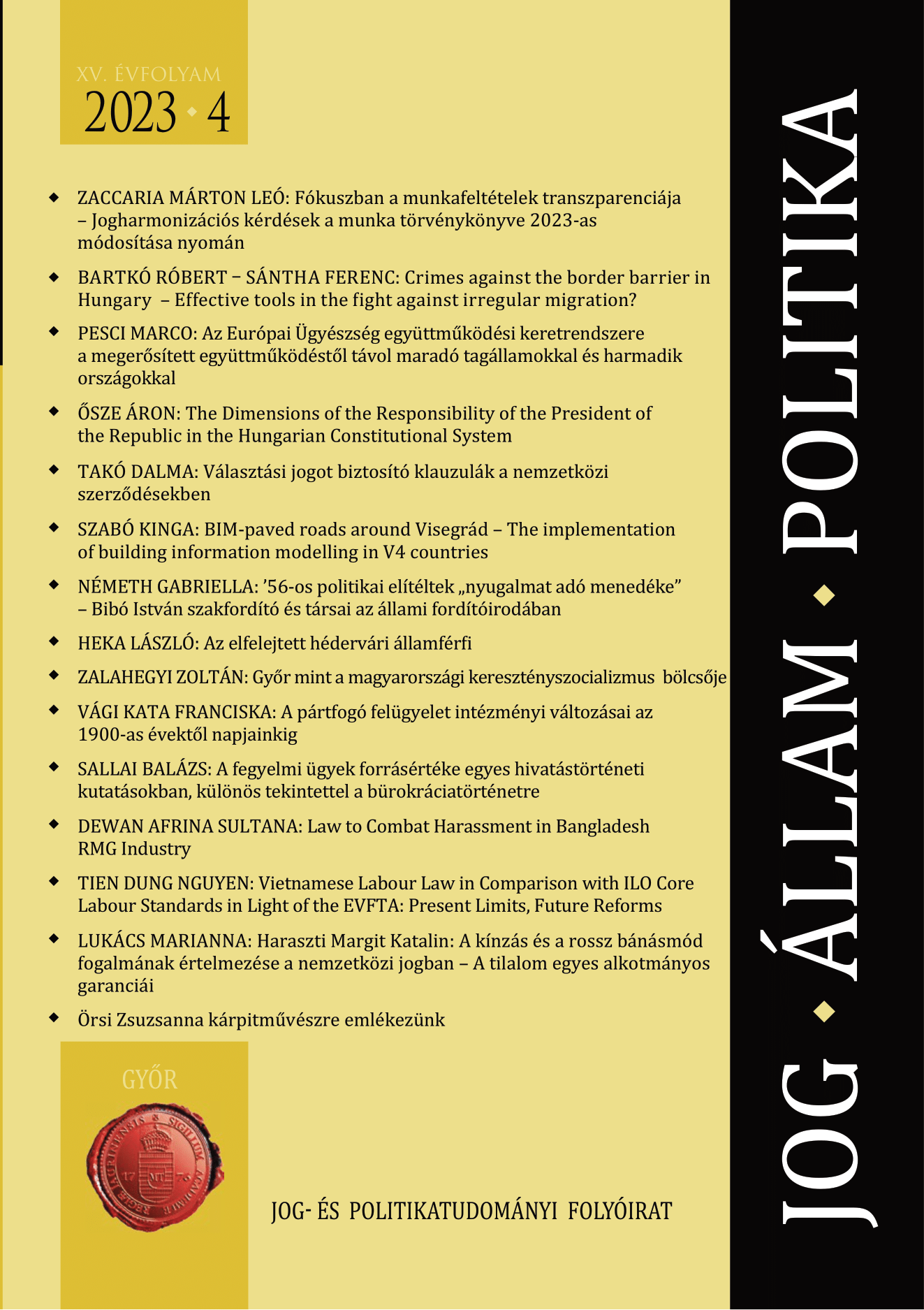Az Európai Ügyészség együttműködési keretrendszere a megerősített együttműködéstől
távol maradó tagállamokkal és harmadik országokkal
| LETÖLTÉS |
Jog-Állam-Politika, 2023/4.43 |
PESCI MARCO
ABSTRACT
June 1, 2022, is one of the most important milestones in the development of European criminal law. On this day, the European Public Prosecutor’s Office, which is responsible for the investigation and prosecution of perpetrators and their accomplices of crimes against the financial interests of the Union, started its operation. Although the EPPO is the first European Union institution with independent investigative and prosecutorial powers, Ireland, Denmark, Sweden, Poland and Hungary have not yet joined the founding Regulation adopted within the framework of enhanced cooperation. Due to the nature of some transnational crimes affecting the economic interests of the European Union – the value of which, according to some estimates, reaches EUR 50 billion per year – there arises a need for the political engagement of member states and third countries that have not yet joined the Regulation. In this paper, I will attempt to explore the mechanism that the EPPO can use should these countries get involved.
KEYWORDS
European Public Prosecutor’s Office * non-participating member states * third countries * loyal cooperation * competent authority
BIBLIOGRAPHY
Aden, Hartmut – Sanchez-Barrueco, Maria-Luisa – Stephenson, Paul (2019): The European Public Prosecutor’s Office: Strategies for Coping with Complexity. European Parliament.
Andrés Delgado, Casteleiro – Larik, Joris (2011): The duty to remain silent: Limitless loyalty in EU external relations? In: European Law Review. Vol. 4/2011.
Beckova, Dominika Marcokova (2022): Relations between the European Public Prosecutor’s Office and the Nonparticipating EU Member States. In: Hristina Rucheva Tasev (ed.): International Academic Institute Academic Conference Proceedings. International Academic Institute, Skopje.
Communication from the Commission to the European Parliament, the European Council, the Council, the European Economic and Social Committee and the Committee of the Regions Mid-term revision of the Multiannual Financial Framework 2021 – 2027. (Elérhető: https://commission.europa.eu/system/files/2023-06/COM_2023_336_1_EN_ACT_part1_v4.pdf. Letöltés ideje: 2023. augusztus 07.).
Dörr, Oliver – Schmalenbach, Kirsten (2012): Vienna Convention on the Law of Treaties: A Commentary. Springer Verlag, Berlin.
EPPO Annual Report 2022. (Elérhető: https://www.eppo.europa.eu/sites/default/files/2023-02/EPPO_2022_Annual_Report_EN_WEB.pdf. Letöltés ideje: 2023. augusztus 07.).
EPPO-LEX: EPPO Atlas. (Elérhető: https://eppo-lex.eu/eppo-atlas/. Letöltés ideje: 2023. augusztus 07.).
EUCRIM: EPPO’s Annual Report for 2022, 2023. (Elérhető: https://eucrim.eu/news/eppos-annual-report-for-2022/. Letöltés ideje: 2023. augusztus 07.).
EUROJUST: Eurojust assists in setting up first joint investigation team with EPPO at request of Swedish authorities, 2022. (Elérhető: https://www.eurojust.europa.eu/news/eurojust-assists-first-joint-investigation-team-eppo-swedish-authorities. Letöltés ideje: 2023. augusztus 07.).
EURONEWS: Finance ministers should ‘be losing sleep’ over extent of tax fraud, says chief EU prosecutor, 2022. (Elérhető: https://www.euronews.com/my-europe/2022/06/01/finance-ministers-should-be-losing-sleep-over-extent-of-tax-fraud-says-chief-eu-prosecutor. Letöltés ideje: 2023. augusztus 07.).
European Public Prosecutor’s Office: Letter sent to European Commission regarding Poland’s refusal to cooperate with the EPPO, 2022. (Elérhető: https://www.eppo.europa.eu/en/news/letter-sent-european-commission-regarding-polands-refusal-cooperate-eppo. Letöltés ideje: 2023. augusztus 07.).
Franssen, Nicholas (2018): The future judicial cooperation between the EPPO and non-participating Member States. In: New Journal of European Criminal Law. Vol. 3/2018. sz.
DOI: https://doi.org/10.1177/2032284418800851.
Gombos Katalin (2012): Az Európai Unió Jogának alapjai. Complex, Budapest.
Herrnfeld, Hans-Holger – Brodowski, Dominik –Burchard, Christoph (2020): European Public Prosecutor’s Office: Article-by-Article Commentary. Beck&Hart, UK–Germany.
JDSUPRA: The Complementary Roles of the European Public Prosecutor’s Office and the European Anti-Fraud Office, 2022. (Elérhető: https://www.jdsupra.com/legalnews/the-complementary-roles-of-the-european-1455820/. Letöltés ideje: 2023. augusztus 07.).
Karsai Krisztina (2019): External Effects of the European Public Prosecutor’s Office Regime. In: Miskolci Jogi Szemle. 2019/2. sz.
Karsai Krisztina (2021): The European Public Prosecutor’s Office and Hungary, Challenge or Missed Opportunity? Transparency International, Berlin.
Kellerbauer, Manuel – Klamert, Marcus – Tomkin, Jonathan (2019): The EU Treaties and the Charter of Fundamental Rights, A Commentary. Oxford University Press, Oxford.
Klamert, Marcus (2014): The Principle of Loyalty in EU Law. Oxford University Press, Oxford.
Konstadinides, Theodore (2017): Constitutional Identity as a Shield and as a Sword: The European Legal Order within the Framework of National Constitutional Settlement. In: Cambridge Yearbook of European Legal Studies. 2017/13. sz.
DOI: https://doi.org/10.1017/S207183220002246X.
Lenaerts, Koen – Van Nuffel, Piet – Corthaut, Tim (2021): EU Constitutional Law. Oxford University Press, Oxford.
Magyarország Európai Unió melletti Állandó Képviselete Brüsszel: Magyarország sem támogatja az Európai Ügyészség létrehozását. (Elérhető: https://eu-brusszel.mfa.gov.hu/news/magyarorszag-sem-tamogatja-az-europai-uegyeszseg-letrehozasat-nyilatkozta-trocsanyi-laszlo-igazsaguegyi-miniszter-bruesszelben. Letöltés ideje: 2023. augusztus 07.).
Malan, Jack – Chen, Ivan (2021): Impact of Organised Crime on the EU’s Financial Interests. European Parliament’s Committee on Budgetary Control.
Mitsilegas, Valsamis (2021): European prosecution between cooperation and integration: The European Public Prosecutor’s Office and the rule of law. In: Maastricht Journal of European and Comparative Law. Vol. 2/2021.
DOI: https://doi.org/10.1177/1023263X211005933.
Ormándy Marcell Ottó (2020): Why do Member States Reject the European Public Prosecutor’s Office? Expressing Dissatisfaction on the Avenues of Disintegration. In: ELTE POL-IR Working Paper Series. 2020/2. sz. Institute of Political and International Studies, Budapest.
Pesci Marco (2023): Az Európai Ügyészség együttműködési keretrendszere az Európai Unió igazságügyi szerveivel. In: Jog–Állam–Politika. 2023/1. sz.
DOI: 10.58528/JAP.2023.15-1.45.
Scheffer, David (1999): The United States and the International Criminal Court. In: American Journal of International Law. Vol. 93/1998. Cambridge University Press.
DOI: https://doi.org/10.2307/2997953.
Statista: The Countries Committing the Most Aid to Ukraine, 2023. (Elérhető: https://www.statista.com/chart/28489/ukrainian-military-humanitarian-and-financial-aid-donors/#:~:text=ukraine%20war,-by%20Martin%20Armstrong&text=Data%20from%20the%20IFW%20Kiel,and%20Japan%20(%247%20billion). Letöltés ideje: 2023. augusztus 07.).
Udvarhelyi Bence (2017): The Protection of the Financial Interests of the European Union – the Past, the Present and the Future. In: Váradi-Csema Erika (szerk.): Criminal Legal Studies: European Challenges And Central European Responses In The Criminal Science Of The 21st Century. Central European Academic Publishing, Budapest.
Udvarhelyi Bence (2019): The European Public Prosecutor’s Office– From Myth to Reality. In: European Integration Studies, A Publication of the University of Miskolc. 2019/1. sz.
UKParliament: The impact of the European Public Prosecutor’s Office on the United Kingdom - European Union Committee, Chapter 3: the Implications of the EPPO. (Elérhető: https://publications.parliament.uk/pa/ld201415/ldselect/ldeucom/53/5306.htm#a13. Letöltés ideje: 2023. augusztus 07.).
Van Elsuwege, Peter (2019): The Duty of Sincere Cooperation and Its Implications for Autonomous Member State Action in the Field of External Relations: Member State Interests and European Union Law. In: Marton Varju (ed.): Between Compliance and Particularism, Member State Interests and European Union Law. Springer.
DOI: 10.1007/978-3-030-05782-4_13.
Villiger, Mark Eugen (2009): Commentary on the 1969 Vienna Convention on the Law of Treaties. BRILL, Leiden.

